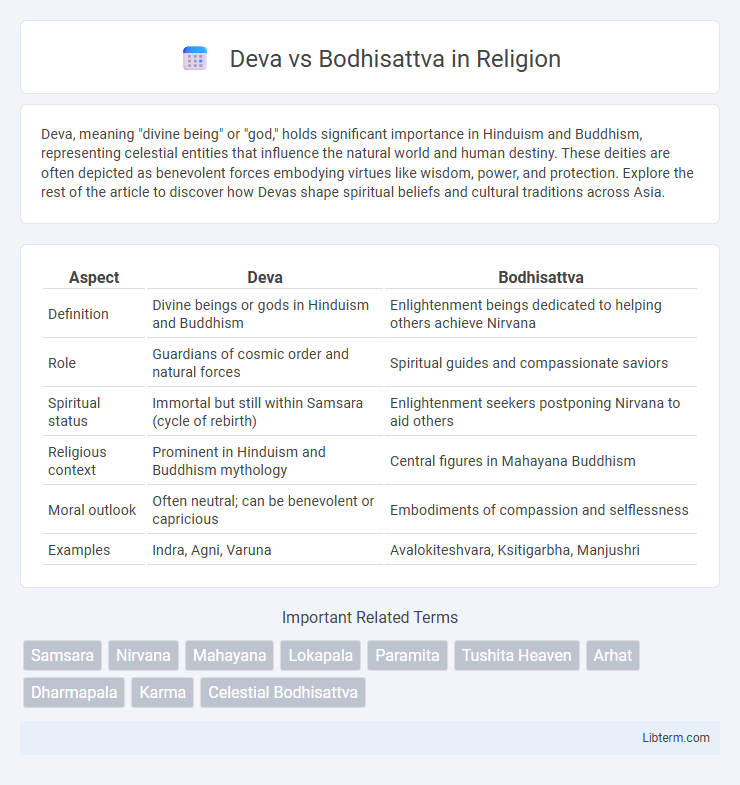Deva, meaning "divine being" or "god," holds significant importance in Hinduism and Buddhism, representing celestial entities that influence the natural world and human destiny. These deities are often depicted as benevolent forces embodying virtues like wisdom, power, and protection. Explore the rest of the article to discover how Devas shape spiritual beliefs and cultural traditions across Asia.
Table of Comparison
| Aspect | Deva | Bodhisattva |
|---|---|---|
| Definition | Divine beings or gods in Hinduism and Buddhism | Enlightenment beings dedicated to helping others achieve Nirvana |
| Role | Guardians of cosmic order and natural forces | Spiritual guides and compassionate saviors |
| Spiritual status | Immortal but still within Samsara (cycle of rebirth) | Enlightenment seekers postponing Nirvana to aid others |
| Religious context | Prominent in Hinduism and Buddhism mythology | Central figures in Mahayana Buddhism |
| Moral outlook | Often neutral; can be benevolent or capricious | Embodiments of compassion and selflessness |
| Examples | Indra, Agni, Varuna | Avalokiteshvara, Ksitigarbha, Manjushri |
Introduction to Deva and Bodhisattva
Devas are celestial beings in Hinduism and Buddhism, often depicted as gods or divine protectors associated with natural forces and cosmic order. Bodhisattvas are enlightened beings in Mahayana Buddhism who forgo personal nirvana to assist others in achieving enlightenment, embodying compassion and selflessness. While devas possess supernatural powers and are worshipped, bodhisattvas are revered for their spiritual dedication and altruistic mission.
Origins and Historical Context
Devas originate from ancient Vedic traditions, representing celestial beings or gods associated with natural forces and cosmic order in Hinduism and early Buddhist texts. Bodhisattvas, emerging within Mahayana Buddhism around the 1st century BCE, embody enlightened beings dedicated to attaining Buddhahood for the sake of all sentient beings, reflecting a shift toward compassion and altruistic spiritual pursuit. The historical context of Devas ties closely to Indo-Aryan mythologies, while Bodhisattvas signify a doctrinal evolution emphasizing selfless enlightenment in Buddhist teachings.
Core Definitions: Deva vs Bodhisattva
Devas are celestial beings in Hindu and Buddhist cosmology characterized by divine powers and a transient existence in heavenly realms. Bodhisattvas are enlightened beings in Mahayana Buddhism who forgo Nirvana to assist others in attaining enlightenment through compassion and wisdom. The core difference lies in Devas' role as gods or supernatural entities, while Bodhisattvas embody selfless spiritual dedication to liberate all sentient beings.
Roles in Buddhist Cosmology
Devas in Buddhist cosmology serve as celestial beings who enjoy higher realms of existence but remain subject to samsara, often representing various natural and cosmic forces. Bodhisattvas, by contrast, embody enlightened compassion, postponing their own nirvana to assist all sentient beings in achieving liberation from suffering. Their roles diverge as Devas primarily experience temporary divine bliss, while Bodhisattvas actively engage in spiritual guidance and altruistic vows within the cycle of rebirth.
Spiritual Goals and Aspirations
Devas pursue spiritual goals centered on enjoying heavenly pleasures and accumulating positive karma, often remaining within samsara due to their attachment to these transient gratifications. Bodhisattvas aspire to attain enlightenment not only for themselves but to liberate all sentient beings, embodying compassion and selfless service as their highest spiritual aims. While Devas focus on personal spiritual elevation within celestial realms, Bodhisattvas dedicate themselves to the ultimate goal of Buddhahood and universal salvation.
Moral and Ethical Characteristics
Devas are celestial beings in Buddhist cosmology known for their divine qualities and pleasure-filled existence but are not necessarily morally superior or enlightened. Bodhisattvas embody profound moral virtues such as compassion, wisdom, and selflessness, dedicating themselves to achieving enlightenment for the benefit of all sentient beings. Unlike Devas, Bodhisattvas actively cultivate ethical conduct and engage in altruistic practices that transcend personal happiness.
Worship and Veneration Practices
Devas, celestial beings in Hindu and Buddhist cosmology, receive worship often through rituals, offerings, and prayers aimed at seeking protection or blessings, highlighting their role as divine guardians. Bodhisattvas, venerated primarily in Mahayana Buddhism, are honored for their compassion and enlightenment through devotional practices such as chanting sutras, meditation, and making symbolic offerings to their statues or images. Worship of Bodhisattvas emphasizes dedication to selfless service and spiritual guidance, contrasting with the more transactional nature of Deva veneration.
Representation in Literature and Art
Devas are frequently depicted in Hindu and Buddhist literature and art as celestial beings embodying divine authority, often portrayed with radiant halos and regal ornaments symbolizing their heavenly status. Bodhisattvas appear prominently in Mahayana Buddhist texts and sculptures, characterized by serene expressions, elaborate crowns, and compassionate postures, representing their vow to attain enlightenment for the sake of all beings. Artistic representations underscore Devas' role as powerful protectors of cosmic order, while Bodhisattvas symbolize altruistic wisdom and spiritual guidance within sacred narratives.
Key Differences and Common Misconceptions
Devas are celestial beings in Hindu and Buddhist cosmology, often considered gods with supernatural powers, whereas Bodhisattvas are enlightened beings in Mahayana Buddhism committed to attaining Buddhahood for the sake of all sentient beings. A key difference lies in their spiritual goals: Devas seek pleasure and longevity within samsara, while Bodhisattvas pursue liberation and compassion-driven enlightenment beyond samsaric existence. Common misconceptions include equating Devas with omnipotent gods and misunderstanding Bodhisattvas as divine, when they are instead human-like figures embodying altruism and spiritual awakening.
Contemporary Relevance and Interpretations
Devas and Bodhisattvas hold distinct roles in contemporary spiritual practices, with Devas often symbolizing celestial beings representing natural forces or divine guardians in modern rituals. Bodhisattvas are revered as enlightened beings embodying compassion and selfless service, inspiring activism and ethical living in current Buddhist communities. Contemporary interpretations emphasize Bodhisattvas' accessible embodiment of spiritual ideals, influencing mindfulness practices and social justice initiatives worldwide.
Deva Infographic

 libterm.com
libterm.com